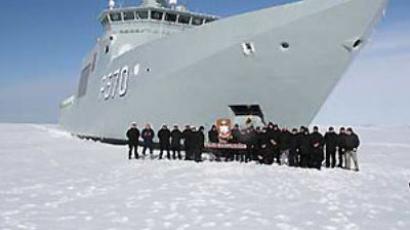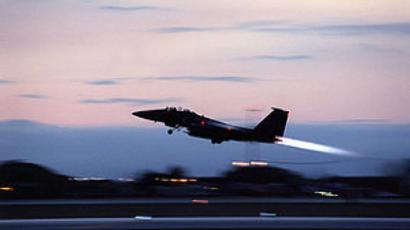ROAR: NATO’s plan to create “roof” over Europe together with Russia “unclear”

NATO Secretary General, Anders Fogh Rasmussen has said that Russia should be included into the alliance’s plans to build a missile defense shield over Europe.
Building a missile defense “roof” in a way that includes Russia would help create “the true European security architecture we would all like to see,” he said, speaking at a news conference in Brussels.
Rasmussen has already spoken about Russia’s possible involvement in the common missile defense shield. On April 14, he said in a video address that “together NATO and Russia should explore co-operation on missile defense – a security roof that will give real security to our people.”
This co-operation may allow the Western alliance to integrate Russia more fully in Euro-Atlantic security, the secretary general believes. According to Rasmussen, there is “a coincidence of interests,” and he is ready to put the idea before the NATO’s summit due to be held in Tallinn, Estonia soon.
As NATO spokesman James Appathurai said, Washington also had been in direct talks with Russia over the common shield. “Real European security architecture” is needed, one that includes the Russians, that is built and maintained with them, the spokesman was quoted by media as saying.
“The West has said that it is prepared to change the most important element of obsolete construction of the European security that has remained since the times of the Cold War,” Vedomosti daily said.
“NATO intends to build a new united system of missile defense, in which Russia will get one of the key positions,” the paper said, citing NATO’s secretary general. “Officially, the plan of the future united missile defense system will be announced at the summit of NATO foreign ministers on Thursday.”
“It is important to understand what has caused the new ideas and what they can mean for Russia,” the daily said. “Some believe that Brussels wants to deploy US missile defense elements in Southern Europe under the guise of consultations.”
However, analysts of the Institute of Strategic Assessments and Analysis and those of the Institute of World Economy and International Relations believe that Rasmussen’s proposals “may become the beginning of resetting the military and political relations between the West and Russia with a European accent,” the paper said.
“Europeans are willing faster than the Americans to abandon fears of the past and build a common defense system,” it stressed. “Some politicians and the military have realized that key security threats to the West and Russia do not come from the former adversaries.”
Among the most important “real threats” the daily cites are illegal proliferation of nuclear and missile materials and technologies, their development by unpredictable regimes and drug trafficking.
“The statement of NATO secretary general may mean that the alliance, or to speak broadly, the West, has got rid of old phobias in strategic planning and the current policies and is inclined to a closer co-operation,” Vedomosti said.
The current missile defense architecture is not able to counter a hypothetical strike of a ballistic missile from Iran or Pakistan, the paper noted. Building new facilities of the shield in Bulgaria, Greece and Romania would consume a lot of time, and equipping battleships and their constant patrolling in the Aegean Sea and the Black Sea is expensive, the paper said.
In the present situation, it is advantageous for Europeans to cooperate with Russia, whose radar stations in Gabala, Azerbaijan and Armavir can track missile launches in most of Southern and Southeastern Asia, the paper said.
At the same time, Moscow may fear that co-operation with the alliance may be a tactical move, and interceptors deployed in Southern Europe may be redirected against the Russian strategic nuclear forces, the daily stressed. But the real co-operation may be a step towards Russia’s integration into the structures of European security and changing NATO itself, it added.
Russia has put forward its own conception of European security, and if the agreement is approved, no country or organization will be able to strengthen its security at the expense of others, Gazeta daily said. Russian officials have repeatedly said that Moscow’s co-operation with NATO would be possible if NATO were ready to change its policies, it added.
The link between missile defense and strategic offensive arms was one of the key topics that Russia and the US discussed during the development of the new START treaty. Now NATO is expected to announce the plan to include Russia into the common shield, but the meeting of the alliance in Tallinn may be canceled because of the Iceland’s volcanic ash.
It is unclear what missile defense systems will be discussed at the meeting in Tallinn, Infox.ru website said. The issue may concern the US project of the missile shield of the seat of war in Europe, it added. Moscow has said it may join the project after the mutual assessment of military threats, the website added.
Meanwhile, the US is planning to deploy a missile shield to defend Europe from a possible strike from Iran, the media say. Representatives of the Pentagon “at last explained why President Barack Obama decided last autumn to abandon plans of creating missile defense system in Poland and the Czech Republic,” Kommersant daily said.
Now Washington is putting forward a new plan to secure 100 per cent defense of European territory, the daily said. The deployment of the new system will take eight years. By 2011, the Pentagon will decide where exactly in southern Europe a radar system will be deployed.
At the same time, the US administration is being criticized by the Republicans for signing the new START treaty, which “allegedly threatens the creation of missile defense,” the paper said. “In fact the new agreement between the two countries removes limitations on conducting tests of elements of missile defense that existed in the START-1 treaty,” the paper said.
The NATO summit in Tallinn will also discuss the issue of the US tactical nuclear weapons in Europe, Nezavisimaya Gazeta daily said, adding that Moscow demand that such weapons be withdrawn to the US.
As for the Russia-NATO cooperation in the missile defense sphere, “one summit is not enough,” although it may further relations between the two parties closer, the paper said, But generalization in this issue is not enough for Russia to make a strategic decision, believes Viktor Yesin, former chief of staff of Strategic Missile Forces.
The details of the NATO secretary general’s plan on the co-operation between Russia and the alliance in the missile defense sphere is not clear now, Yesin told Nezavisimaya Gazeta. Judging by discussions conducted in the framework of the presidential commission created by Dmitry Medvedev and Barack Obama, Russia may be offered to join only missile shield for Europe, the analyst said. “What is important is the conditions and format,” he added.
The participation in creating such a shield will be advantageous for Russia only if the interests of all the countries involved are taken into consideration, the analyst said. “Unfounded reassurances that the US’s missile defense will not be directed against Russia cannot calm down Moscow,” he stressed.
Sergey Borisov,
Russian Opinion and Analysis Review, RT














